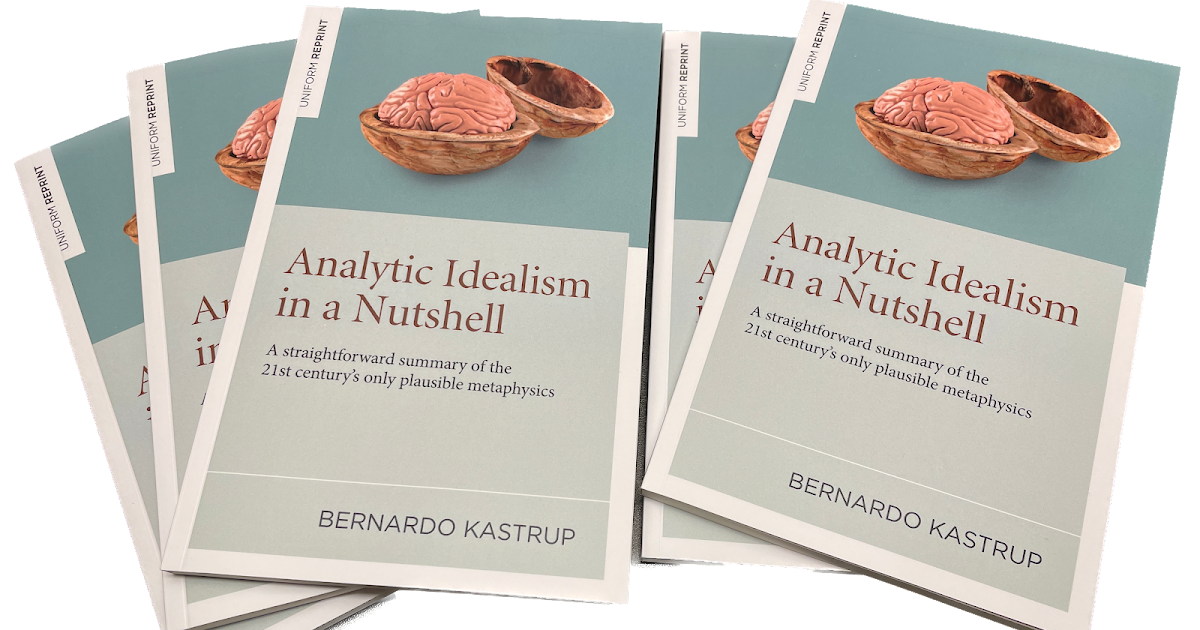steve_bank
Diabetic retinopathy and poor eyesight. Typos ...
There is an eerie unreal quality to this tread. As if it is a reality or dimension all unto itself.
Kastrup offers many ideas that are not easily dismissed, IMO. OTOH, acceptance of those arguments also is logically more than difficult. Discussion of those arguments, based on the world we observe, is also difficult. IDK, the choices we are offered are not that easy to decide upon. Many people of the highest intellectual category have offered many such flawed solutions in the past, as their best effort and guess. What I do here, therefore, seems to be to make my own choice. Based on my own best guesses, and what I see as evidence, and those whom I see as those providing evidence worthy of taking seriously.Pre-emptive dismissal of an idea is often warranted, such as when someone argues that the eye is not a sense organ or that we see in real times. But we can pre-emptively dismiss such claims because we already possess mountains of evidence that the claims not only are not true, but cannot be true.
I think metaphysical idealism is in different category that is not worthy of such a response. Analytic idealism is a modern variant of a strain of philosophy that goes back to antiquity. Of course that doesn’t make any of it right, it just makes it not obviously wrong. Kastrup offers plenty of evidence-based arguments for his position. Those who care to can read the linked paper and evaluate his philosophy on its own merits. Of course those who dismiss philosophy in its entirety are devoted to a philosophy called scientism, and thereby pre-empitvely refute their own dismissal.
Analytic Idealism is a theory of the nature of reality that maintains that the universe is experiential in essence. That does not mean that reality is in your or our individual minds alone, but instead in a spatially unbound, transpersonal field of subjectivity of which we are segments.
Kastrup is best known for the development of analytic idealism, a metaphysical and ontological framework that posits phenomenal consciousness is the fundamental "reduction base" of reality as a whole, and that individual minds are dissociations of the monist universal mind.
In philosophy, "monism" refers to the belief that reality is ultimately composed of one single substance or principle, contrasting with dualism (two substances) or pluralism (multiple substances).
Panpsychism posits that consciousness is a fundamental and ubiquitous feature of nature, while analytic idealism suggests that reality is fundamentally experiential, though not necessarily confined to individual minds, but rather a transpersonal field of subjectivity.

How do you know it's not, until you try it?I wouldn't call a psychotic break an achievement.And a whole industry geared to prevent you from achieving it.
It isn't one because I decided with my mind that it isn't. SeeeeHow do you know it's not, until you try it?I wouldn't call a psychotic break an achievement.And a whole industry geared to prevent you from achieving it.
Yes we do, in IIT.we have no such account for how subjective experience emerges from underlying neuronal activity
Yes we do, in IIT.we have no such account for how subjective experience emerges from underlying neuronal activity
Whereas I would say subjectivity is accounted for by locality.As to death, Kastrup’s idealism holds that our ego will perish — our individual “I” — but subjective experience will persist, because subjectivity is all that there is. He seems to anticipate some sort of re-emerging with the universal consciousness, but his view could just as well accommodate that espoused by Tom Clark at naturalism.org, by Wayne Stewart, and peacegirl’s writer, that our field of subjectivity will simply shift to that of another person. I remarked discussing this in another thread that this shift of subjectivity could only, in my view, be accounted for by some universal consciousness that allows for a shift in subjective perspective. After that I stumbled upon Kastrup, which is one reason I find his views intriguing if not persuasive.
I mean, we have a model right there of the subject (the AND gate), and we have a model of what it experiences (switch behaviors on potentials), and we have a diagram that well discusses how and why this creates a "logical state machine".Yes we do, in IIT.we have no such account for how subjective experience emerges from underlying neuronal activity
That’s interesting, because Kastrup espouses IIT.
I see no strong model of how neuronal activity generates subjective experience. Maybe you could clarify how IIT provides it, since Kastrup talks about IIT but sees no solution to the hard problem in it.
I mean, I already posed a drug-fuelled woo which allows IIT in a stage of metaphysical idealism, however the metaphysical idealism would have, in such a setting, *become* physicalism.In defense of integrated information theory. In this essay, Kastrup defends IIT and argues it does not, as he himself had initially supposed, carry a metaphysical commitment to naturalism/physicalism.
Hence why I tend to just observe "internality of the computer is internality of the mind; these are the same thing. Mystery solved. Let's just get back to building cool shit, even if that means there's a mind in there; let's just be careful to treat it well IFF the mind is one that could potentially care how it is treated.""Mind did it" is no different than "god did it".
